Comparative Analysis of Project Methodologies and Life Cycle Report
VerifiedAdded on 2021/04/21
|6
|1300
|200
Report
AI Summary
This report delves into the realm of project methodologies, offering a detailed examination of project management frameworks. It begins by defining project methodology, exploring its significance in predicting project success and guiding project managers. The report then compares and contrasts two prominent methodologies: PMBOK and Agile Scrum, highlighting their distinct approaches, strengths, and limitations. Furthermore, it elucidates the relationship between Agile Scrum methodology and the project life cycle (PLC), illustrating how the phases of Agile Scrum align with the stages of the PLC, including planning, development, testing, delivery, and assessment. The report also includes the references used to support the arguments and findings. This report provides valuable insights into the effective application of project management methodologies.
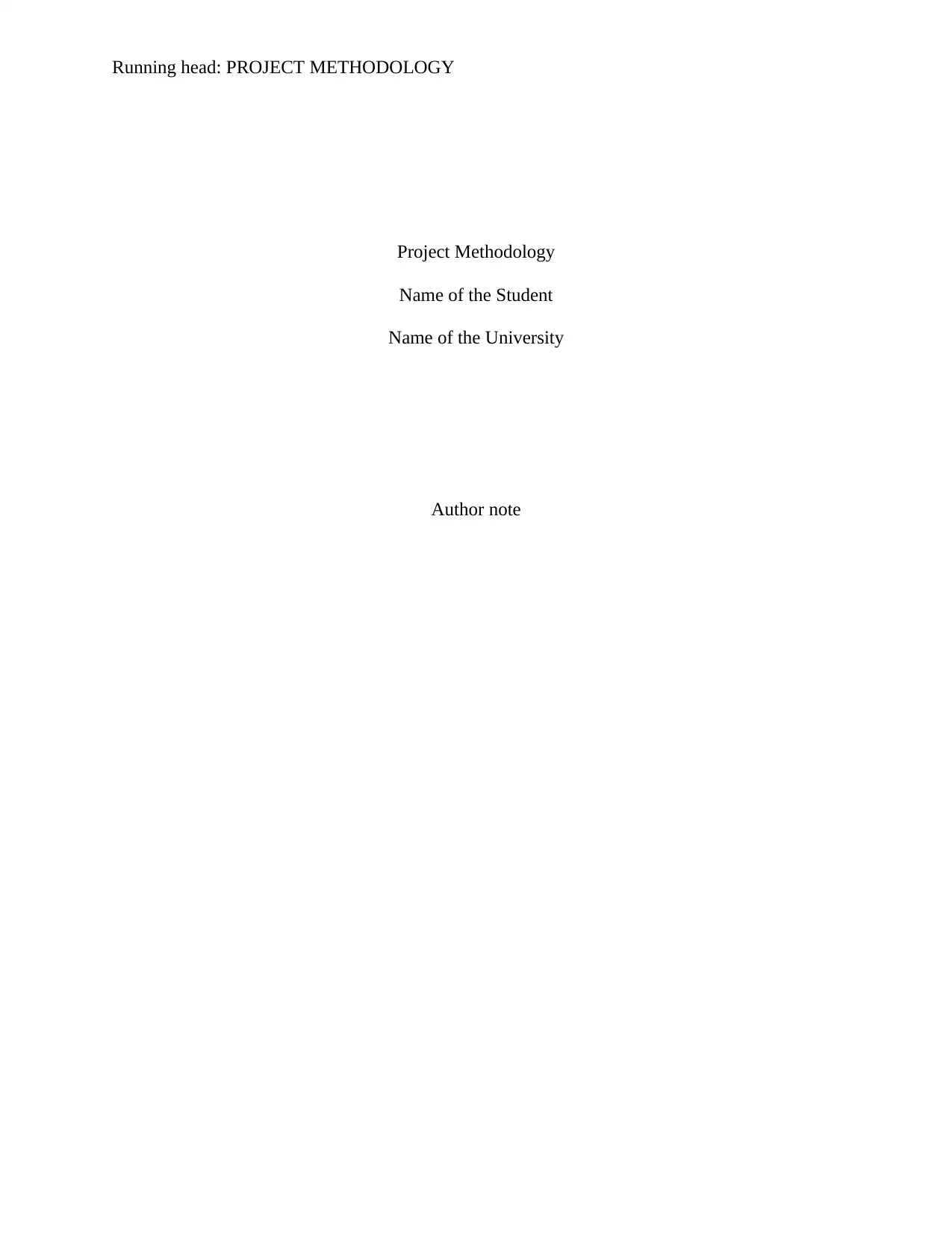
Running head: PROJECT METHODOLOGY
Project Methodology
Name of the Student
Name of the University
Author note
Project Methodology
Name of the Student
Name of the University
Author note
Paraphrase This Document
Need a fresh take? Get an instant paraphrase of this document with our AI Paraphraser
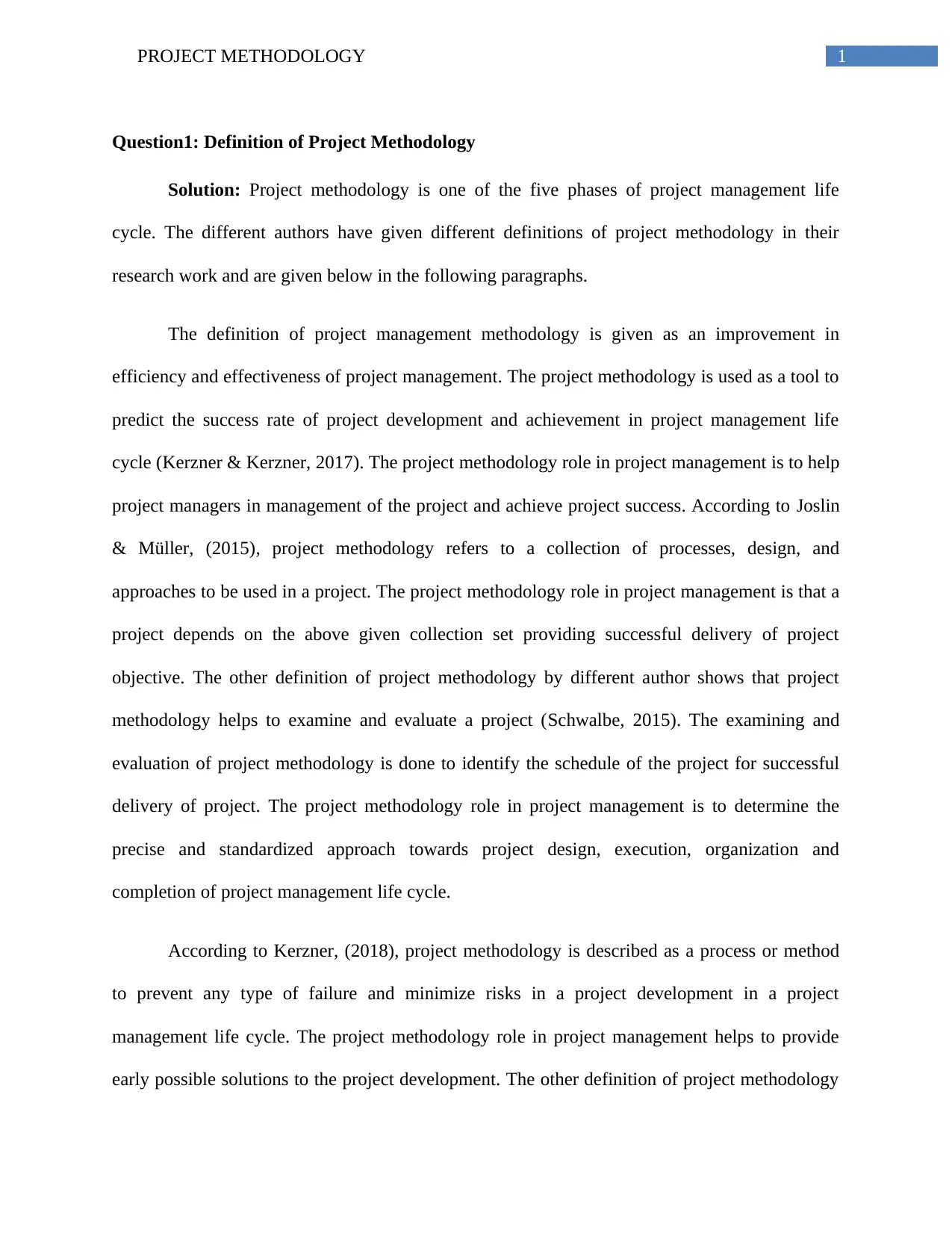
1PROJECT METHODOLOGY
Question1: Definition of Project Methodology
Solution: Project methodology is one of the five phases of project management life
cycle. The different authors have given different definitions of project methodology in their
research work and are given below in the following paragraphs.
The definition of project management methodology is given as an improvement in
efficiency and effectiveness of project management. The project methodology is used as a tool to
predict the success rate of project development and achievement in project management life
cycle (Kerzner & Kerzner, 2017). The project methodology role in project management is to help
project managers in management of the project and achieve project success. According to Joslin
& Müller, (2015), project methodology refers to a collection of processes, design, and
approaches to be used in a project. The project methodology role in project management is that a
project depends on the above given collection set providing successful delivery of project
objective. The other definition of project methodology by different author shows that project
methodology helps to examine and evaluate a project (Schwalbe, 2015). The examining and
evaluation of project methodology is done to identify the schedule of the project for successful
delivery of project. The project methodology role in project management is to determine the
precise and standardized approach towards project design, execution, organization and
completion of project management life cycle.
According to Kerzner, (2018), project methodology is described as a process or method
to prevent any type of failure and minimize risks in a project development in a project
management life cycle. The project methodology role in project management helps to provide
early possible solutions to the project development. The other definition of project methodology
Question1: Definition of Project Methodology
Solution: Project methodology is one of the five phases of project management life
cycle. The different authors have given different definitions of project methodology in their
research work and are given below in the following paragraphs.
The definition of project management methodology is given as an improvement in
efficiency and effectiveness of project management. The project methodology is used as a tool to
predict the success rate of project development and achievement in project management life
cycle (Kerzner & Kerzner, 2017). The project methodology role in project management is to help
project managers in management of the project and achieve project success. According to Joslin
& Müller, (2015), project methodology refers to a collection of processes, design, and
approaches to be used in a project. The project methodology role in project management is that a
project depends on the above given collection set providing successful delivery of project
objective. The other definition of project methodology by different author shows that project
methodology helps to examine and evaluate a project (Schwalbe, 2015). The examining and
evaluation of project methodology is done to identify the schedule of the project for successful
delivery of project. The project methodology role in project management is to determine the
precise and standardized approach towards project design, execution, organization and
completion of project management life cycle.
According to Kerzner, (2018), project methodology is described as a process or method
to prevent any type of failure and minimize risks in a project development in a project
management life cycle. The project methodology role in project management helps to provide
early possible solutions to the project development. The other definition of project methodology
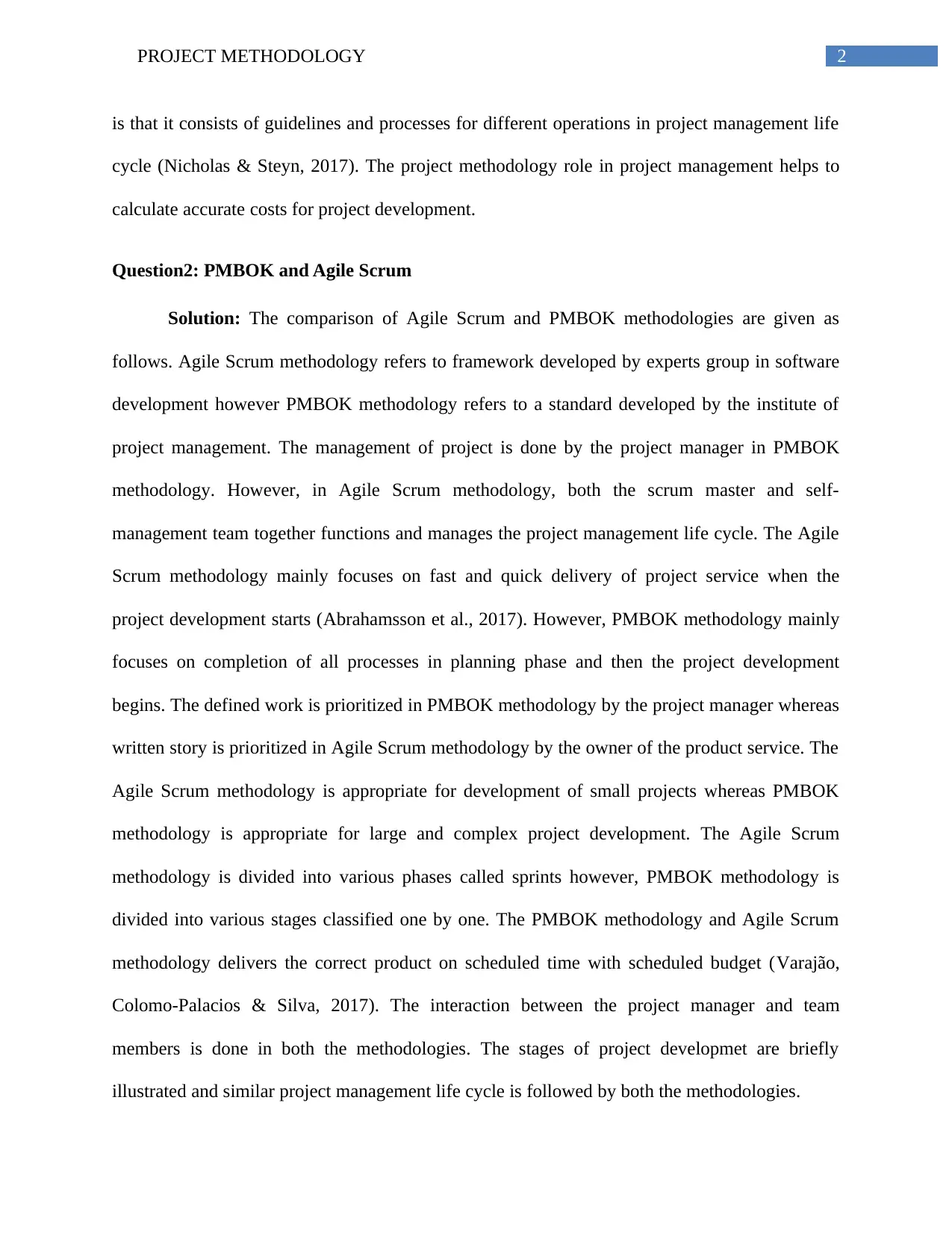
2PROJECT METHODOLOGY
is that it consists of guidelines and processes for different operations in project management life
cycle (Nicholas & Steyn, 2017). The project methodology role in project management helps to
calculate accurate costs for project development.
Question2: PMBOK and Agile Scrum
Solution: The comparison of Agile Scrum and PMBOK methodologies are given as
follows. Agile Scrum methodology refers to framework developed by experts group in software
development however PMBOK methodology refers to a standard developed by the institute of
project management. The management of project is done by the project manager in PMBOK
methodology. However, in Agile Scrum methodology, both the scrum master and self-
management team together functions and manages the project management life cycle. The Agile
Scrum methodology mainly focuses on fast and quick delivery of project service when the
project development starts (Abrahamsson et al., 2017). However, PMBOK methodology mainly
focuses on completion of all processes in planning phase and then the project development
begins. The defined work is prioritized in PMBOK methodology by the project manager whereas
written story is prioritized in Agile Scrum methodology by the owner of the product service. The
Agile Scrum methodology is appropriate for development of small projects whereas PMBOK
methodology is appropriate for large and complex project development. The Agile Scrum
methodology is divided into various phases called sprints however, PMBOK methodology is
divided into various stages classified one by one. The PMBOK methodology and Agile Scrum
methodology delivers the correct product on scheduled time with scheduled budget (Varajão,
Colomo-Palacios & Silva, 2017). The interaction between the project manager and team
members is done in both the methodologies. The stages of project developmet are briefly
illustrated and similar project management life cycle is followed by both the methodologies.
is that it consists of guidelines and processes for different operations in project management life
cycle (Nicholas & Steyn, 2017). The project methodology role in project management helps to
calculate accurate costs for project development.
Question2: PMBOK and Agile Scrum
Solution: The comparison of Agile Scrum and PMBOK methodologies are given as
follows. Agile Scrum methodology refers to framework developed by experts group in software
development however PMBOK methodology refers to a standard developed by the institute of
project management. The management of project is done by the project manager in PMBOK
methodology. However, in Agile Scrum methodology, both the scrum master and self-
management team together functions and manages the project management life cycle. The Agile
Scrum methodology mainly focuses on fast and quick delivery of project service when the
project development starts (Abrahamsson et al., 2017). However, PMBOK methodology mainly
focuses on completion of all processes in planning phase and then the project development
begins. The defined work is prioritized in PMBOK methodology by the project manager whereas
written story is prioritized in Agile Scrum methodology by the owner of the product service. The
Agile Scrum methodology is appropriate for development of small projects whereas PMBOK
methodology is appropriate for large and complex project development. The Agile Scrum
methodology is divided into various phases called sprints however, PMBOK methodology is
divided into various stages classified one by one. The PMBOK methodology and Agile Scrum
methodology delivers the correct product on scheduled time with scheduled budget (Varajão,
Colomo-Palacios & Silva, 2017). The interaction between the project manager and team
members is done in both the methodologies. The stages of project developmet are briefly
illustrated and similar project management life cycle is followed by both the methodologies.
⊘ This is a preview!⊘
Do you want full access?
Subscribe today to unlock all pages.

Trusted by 1+ million students worldwide
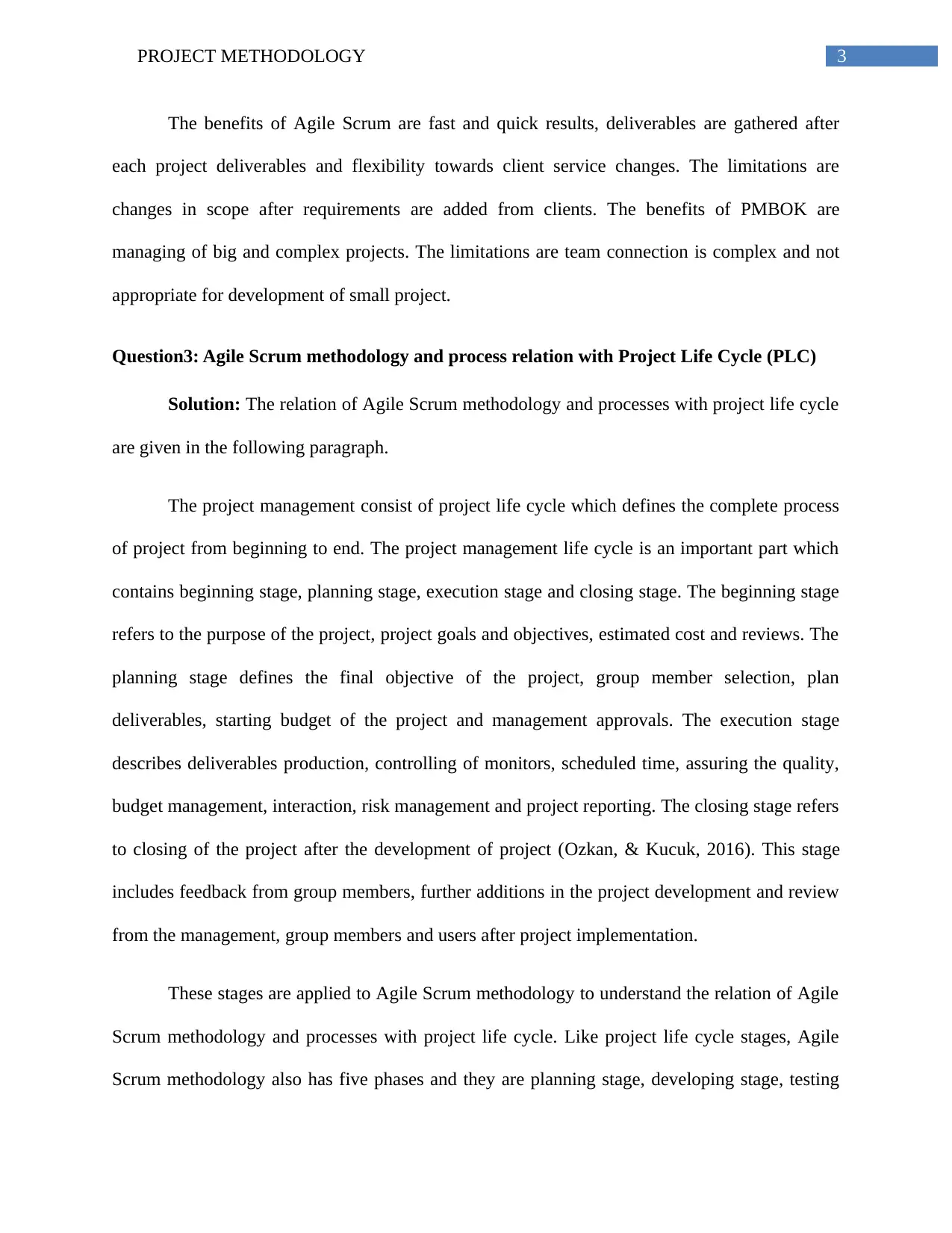
3PROJECT METHODOLOGY
The benefits of Agile Scrum are fast and quick results, deliverables are gathered after
each project deliverables and flexibility towards client service changes. The limitations are
changes in scope after requirements are added from clients. The benefits of PMBOK are
managing of big and complex projects. The limitations are team connection is complex and not
appropriate for development of small project.
Question3: Agile Scrum methodology and process relation with Project Life Cycle (PLC)
Solution: The relation of Agile Scrum methodology and processes with project life cycle
are given in the following paragraph.
The project management consist of project life cycle which defines the complete process
of project from beginning to end. The project management life cycle is an important part which
contains beginning stage, planning stage, execution stage and closing stage. The beginning stage
refers to the purpose of the project, project goals and objectives, estimated cost and reviews. The
planning stage defines the final objective of the project, group member selection, plan
deliverables, starting budget of the project and management approvals. The execution stage
describes deliverables production, controlling of monitors, scheduled time, assuring the quality,
budget management, interaction, risk management and project reporting. The closing stage refers
to closing of the project after the development of project (Ozkan, & Kucuk, 2016). This stage
includes feedback from group members, further additions in the project development and review
from the management, group members and users after project implementation.
These stages are applied to Agile Scrum methodology to understand the relation of Agile
Scrum methodology and processes with project life cycle. Like project life cycle stages, Agile
Scrum methodology also has five phases and they are planning stage, developing stage, testing
The benefits of Agile Scrum are fast and quick results, deliverables are gathered after
each project deliverables and flexibility towards client service changes. The limitations are
changes in scope after requirements are added from clients. The benefits of PMBOK are
managing of big and complex projects. The limitations are team connection is complex and not
appropriate for development of small project.
Question3: Agile Scrum methodology and process relation with Project Life Cycle (PLC)
Solution: The relation of Agile Scrum methodology and processes with project life cycle
are given in the following paragraph.
The project management consist of project life cycle which defines the complete process
of project from beginning to end. The project management life cycle is an important part which
contains beginning stage, planning stage, execution stage and closing stage. The beginning stage
refers to the purpose of the project, project goals and objectives, estimated cost and reviews. The
planning stage defines the final objective of the project, group member selection, plan
deliverables, starting budget of the project and management approvals. The execution stage
describes deliverables production, controlling of monitors, scheduled time, assuring the quality,
budget management, interaction, risk management and project reporting. The closing stage refers
to closing of the project after the development of project (Ozkan, & Kucuk, 2016). This stage
includes feedback from group members, further additions in the project development and review
from the management, group members and users after project implementation.
These stages are applied to Agile Scrum methodology to understand the relation of Agile
Scrum methodology and processes with project life cycle. Like project life cycle stages, Agile
Scrum methodology also has five phases and they are planning stage, developing stage, testing
Paraphrase This Document
Need a fresh take? Get an instant paraphrase of this document with our AI Paraphraser
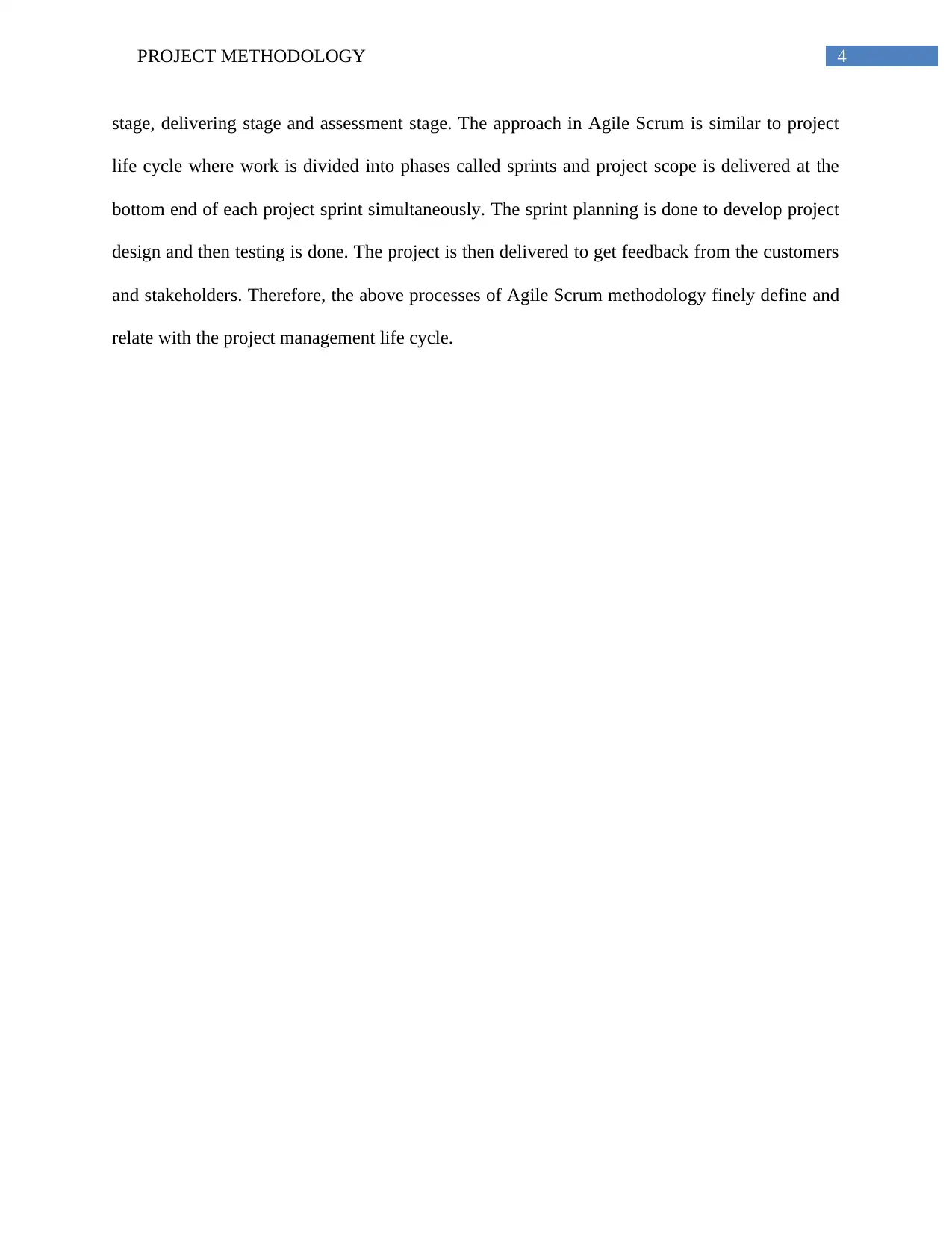
4PROJECT METHODOLOGY
stage, delivering stage and assessment stage. The approach in Agile Scrum is similar to project
life cycle where work is divided into phases called sprints and project scope is delivered at the
bottom end of each project sprint simultaneously. The sprint planning is done to develop project
design and then testing is done. The project is then delivered to get feedback from the customers
and stakeholders. Therefore, the above processes of Agile Scrum methodology finely define and
relate with the project management life cycle.
stage, delivering stage and assessment stage. The approach in Agile Scrum is similar to project
life cycle where work is divided into phases called sprints and project scope is delivered at the
bottom end of each project sprint simultaneously. The sprint planning is done to develop project
design and then testing is done. The project is then delivered to get feedback from the customers
and stakeholders. Therefore, the above processes of Agile Scrum methodology finely define and
relate with the project management life cycle.
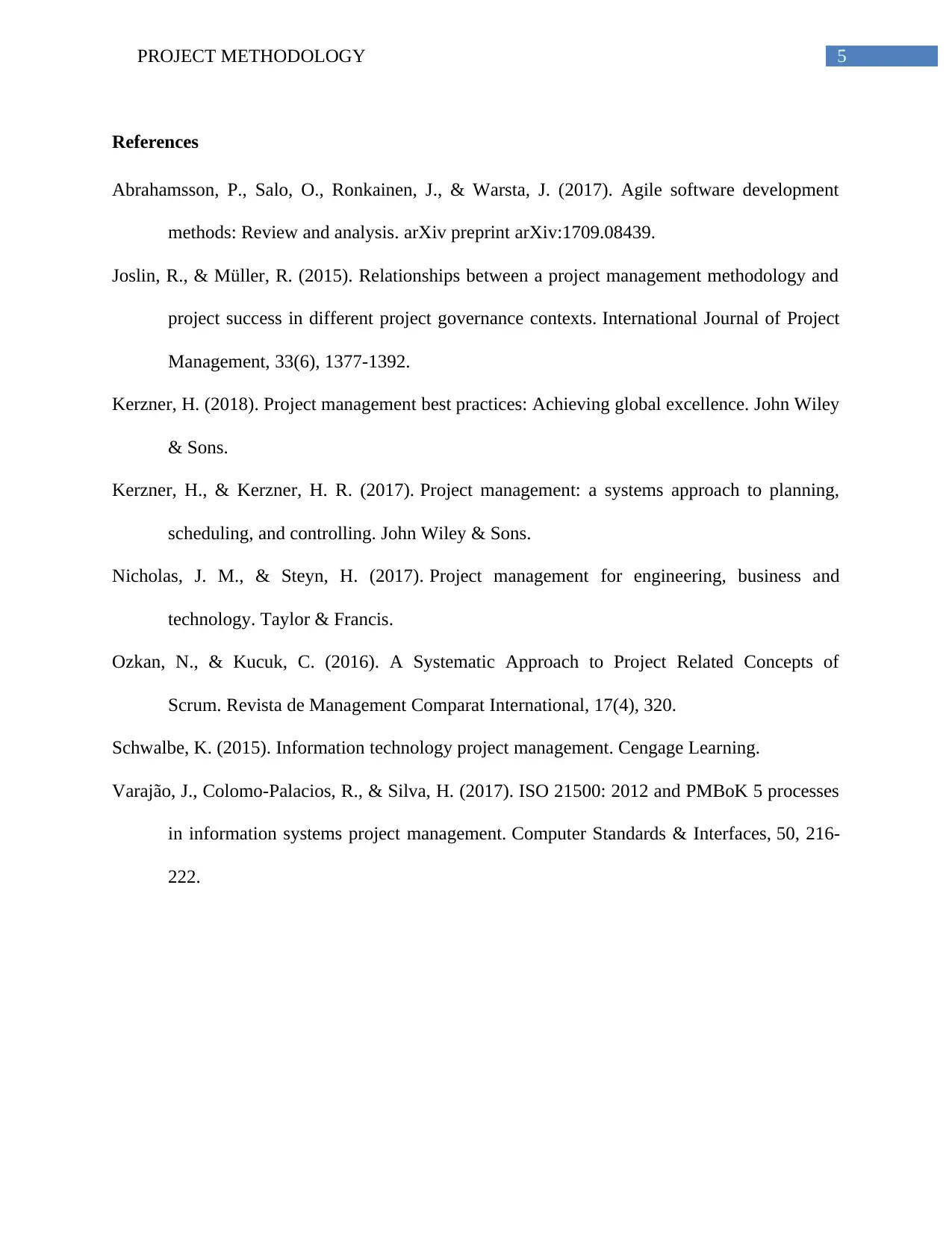
5PROJECT METHODOLOGY
References
Abrahamsson, P., Salo, O., Ronkainen, J., & Warsta, J. (2017). Agile software development
methods: Review and analysis. arXiv preprint arXiv:1709.08439.
Joslin, R., & Müller, R. (2015). Relationships between a project management methodology and
project success in different project governance contexts. International Journal of Project
Management, 33(6), 1377-1392.
Kerzner, H. (2018). Project management best practices: Achieving global excellence. John Wiley
& Sons.
Kerzner, H., & Kerzner, H. R. (2017). Project management: a systems approach to planning,
scheduling, and controlling. John Wiley & Sons.
Nicholas, J. M., & Steyn, H. (2017). Project management for engineering, business and
technology. Taylor & Francis.
Ozkan, N., & Kucuk, C. (2016). A Systematic Approach to Project Related Concepts of
Scrum. Revista de Management Comparat International, 17(4), 320.
Schwalbe, K. (2015). Information technology project management. Cengage Learning.
Varajão, J., Colomo-Palacios, R., & Silva, H. (2017). ISO 21500: 2012 and PMBoK 5 processes
in information systems project management. Computer Standards & Interfaces, 50, 216-
222.
References
Abrahamsson, P., Salo, O., Ronkainen, J., & Warsta, J. (2017). Agile software development
methods: Review and analysis. arXiv preprint arXiv:1709.08439.
Joslin, R., & Müller, R. (2015). Relationships between a project management methodology and
project success in different project governance contexts. International Journal of Project
Management, 33(6), 1377-1392.
Kerzner, H. (2018). Project management best practices: Achieving global excellence. John Wiley
& Sons.
Kerzner, H., & Kerzner, H. R. (2017). Project management: a systems approach to planning,
scheduling, and controlling. John Wiley & Sons.
Nicholas, J. M., & Steyn, H. (2017). Project management for engineering, business and
technology. Taylor & Francis.
Ozkan, N., & Kucuk, C. (2016). A Systematic Approach to Project Related Concepts of
Scrum. Revista de Management Comparat International, 17(4), 320.
Schwalbe, K. (2015). Information technology project management. Cengage Learning.
Varajão, J., Colomo-Palacios, R., & Silva, H. (2017). ISO 21500: 2012 and PMBoK 5 processes
in information systems project management. Computer Standards & Interfaces, 50, 216-
222.
⊘ This is a preview!⊘
Do you want full access?
Subscribe today to unlock all pages.

Trusted by 1+ million students worldwide
1 out of 6
Related Documents
Your All-in-One AI-Powered Toolkit for Academic Success.
+13062052269
info@desklib.com
Available 24*7 on WhatsApp / Email
![[object Object]](/_next/static/media/star-bottom.7253800d.svg)
Unlock your academic potential
Copyright © 2020–2026 A2Z Services. All Rights Reserved. Developed and managed by ZUCOL.





